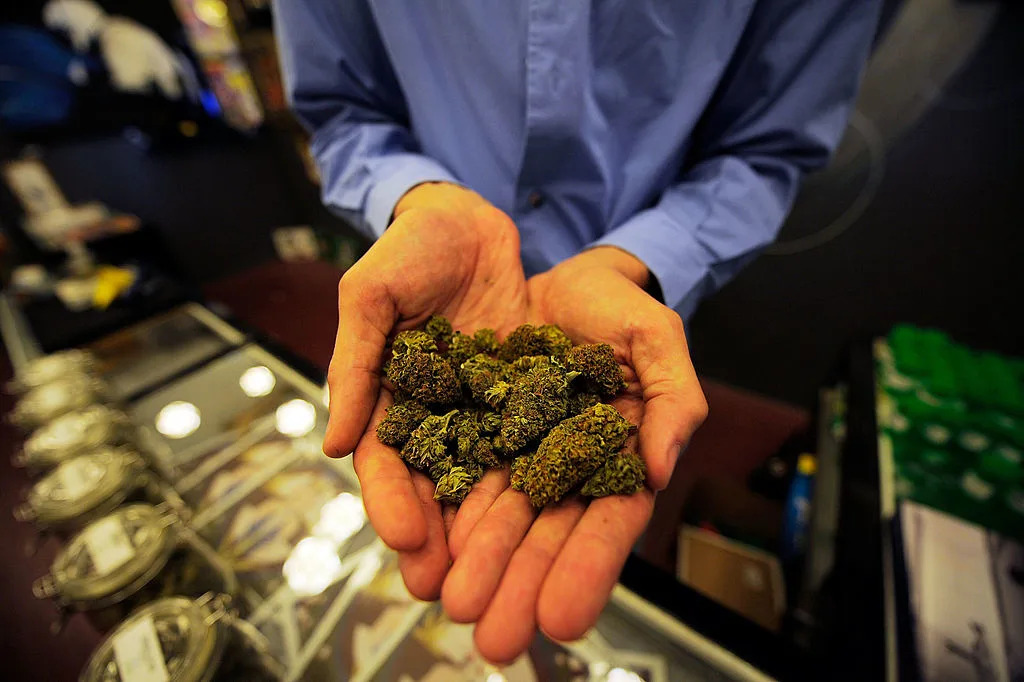The Cannabis Regulatory Commission approved hiking a fee intended to pay for social equity programs by $1.26 per ounce starting on Jan. 1. (Kevork Djansezian | Getty Images)
New Jersey cannabis regulators on Thursday approved raising a cannabis fee intended to pay for social equity programs and announced a long-awaited application process for consumption lounges.
The five-member Cannabis Regulatory Commission approved raising the social equity fee to $2.50 per ounce, up from $1.24, starting on Jan. 1. The panel had been expected to approve the new fee at its Oct. 30 meeting but delayed the vote until Thursday.
The revenue collected from the fee, paid for by cannabis cultivators, goes into a fund dedicated to social equity programs and reinvesting in communities harmed by marijuana criminalization. A portion of the fee also goes to programs to divert youth from cannabis use.
Progressive advocates have pushed to raise the fee to the legal maximum of $30. Some commissioners expressed reservations over increasing the fee that much, with Commissioner Krista Nash suggesting it could “decimate some businesses, and we certainly don’t want to undo what those businesses could create.”
In fiscal year 2024, the fee brought in an estimated $2.6 million, but none of the money has been spent (the funds are allocated by the Legislature and governor). Commissioner Charles Barker said the commission should collaborate with lawmakers to ensure the money is well spent.
Barker, who abstained from voting on the measure increasing the fee, noted that New Jersey still has some of the highest cannabis prices in the nation and that major companies that produce the majority of the supply should provide more affordable prices.
Since the commission acted to keep the fee low, Barker said, he hopes “the industry responds in kind.”
“We hope prices continue to decrease significantly,” he said.
Commissioner Maria Del Cid-Kosso, who had proposed a $10 fee at the October meeting, said Thursday that after talking with different stakeholders, she saw issues that could create for applicants and licensees getting their businesses started.
Ami Kachalia, campaign strategist at the American Civil Liberties Union of New Jersey, supported hiking the fee to the $30 maximum. She called not doing so a “failure to live up to the promise of community reinvestment that was embedded in the legalization law.”
The fee approved Thursday is 12 times lower than the $30 cap in the state’s recreational cannabis legalization law, leaving millions of dollars on the table meant for vulnerable communities harmed by the war on drugs, Kachalia said.
“Ignoring the law’s promise also sets a precedent for future CRC commissioners and elected officials to disregard the reparative goals of legalization,” she said. “We urge you, we urge New Jersey, to do more in the future to deliver on your promises.”
Consumption lounges
The launch of applications for consumption lounges comes nearly a year after the panel first announced the process would begin.
Beginning Jan. 2, the commission will accept applications from social equity businesses, which are owned by people who have lived in one of New Jersey’s 55 economically disadvantaged areas.
The second round of applications will begin April 2 for diversely owned businesses — certified as minority-, woman-, or disabled veteran-owned. And beginning July 2, anyone can apply.
For microbusinesses — dispensaries that have fewer than 11 employees and take up no more than 2,500 square feet of space — applications will cost $1,000, and for standard dispensaries, $5,000.
Despite cannabis legalization in 2022, there’s virtually no place to smoke weed other than inside a private residence. Consumption lounges would offer a space for both medical and recreational cannabis users to ingest or smoke weed in areas with strict rules. Lounges, which could be inside or outside of a dispensary, would follow similar rules to bars. Customers would be required to show photo ID and would not be able to take unconsumed cannabis off the premises.
Business owners have lamented that the commission has taken too long to open the application process, and some business owners say they found loopholes to host events anyway.
The commission does not have a cap on consumption areas since it’s up to municipalities to limit the number of cannabis businesses. While about a third of towns allow cannabis sales in their towns, very few have passed ordinances allowing consumption lounges.
Chairwoman Dianna Houenou said a standardized form will be uploaded that explains how to obtain municipal approval. Applicants will also need to submit detailed floor plans and standard operating procedures, and show ADA compliance, she said.
H/T: news.yahoo.com
You can view the whole article at this link Cannabis regulators hike special fee for 2025



